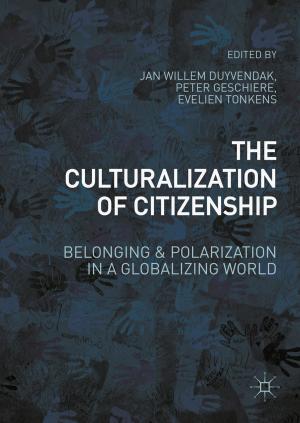Nation, Class and Resentment
The Politics of National Identity in England, Scotland and Wales
Nonfiction, Social & Cultural Studies, Political Science, International, Social Science, Sociology| Author: | Steve Fenton, Robin Mann | ISBN: | 9781137466747 |
| Publisher: | Palgrave Macmillan UK | Publication: | January 20, 2017 |
| Imprint: | Palgrave Macmillan | Language: | English |
| Author: | Steve Fenton, Robin Mann |
| ISBN: | 9781137466747 |
| Publisher: | Palgrave Macmillan UK |
| Publication: | January 20, 2017 |
| Imprint: | Palgrave Macmillan |
| Language: | English |
This timely book provides an extensive account of national identities in three of the constituent nations of the United Kingdom: Wales, Scotland and England. In all three contexts, identity and nationalism have become questions of acute interest in both academic and political commentary. The authors take stock of a wealth of empirical material and explore how attitudes to nation and state can be understood by relating them to changes in contemporary capitalist economies, and the consequences for particular class fractions. The book argues that these changes give rise to a set of resentments among people who perceive themselves to be losing out, concluding that class resentments, depending on historical and political factors relevant to each nation, can take the form of either sub-state nationalism or right wing populism. Nation, Class and Resentment shows that the politics of resentment is especially salient in England, where the promotion of a distinct national identity is problematic. Students and scholars across a range of disciplines, including sociology and politics, will find this study of interest.
This timely book provides an extensive account of national identities in three of the constituent nations of the United Kingdom: Wales, Scotland and England. In all three contexts, identity and nationalism have become questions of acute interest in both academic and political commentary. The authors take stock of a wealth of empirical material and explore how attitudes to nation and state can be understood by relating them to changes in contemporary capitalist economies, and the consequences for particular class fractions. The book argues that these changes give rise to a set of resentments among people who perceive themselves to be losing out, concluding that class resentments, depending on historical and political factors relevant to each nation, can take the form of either sub-state nationalism or right wing populism. Nation, Class and Resentment shows that the politics of resentment is especially salient in England, where the promotion of a distinct national identity is problematic. Students and scholars across a range of disciplines, including sociology and politics, will find this study of interest.















